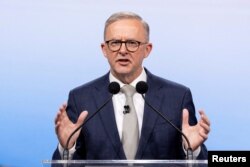Relations with China are a key campaign issue as Australians prepare to vote in a general election on May 21. Both major parties have accused each other of inaction or connivance in their approach to diplomacy with China, which is Australia’s biggest trading partner.
China recently signed a controversial security pact with Solomon Islands, one of Australia’s traditional allies in the Pacific Ocean.
That move prompted fears of Chinese expansion in the region, as well as recriminations.
Prime Minister Scott Morrison, who is seeking reelection on May 21, was accused by opposition politicians of doing too little to prevent a strategic neighbor aligning with China.
Officials in Solomon Islands, an archipelago northeast of Australia, say there are no plans to allow China to set up a permanent military base, despite concerns by politicians in Canberra and Washington.
Morrison says he has worked hard with Australia’s allies to bring stability to the region.
“I mean, it is 80 years ago right now since Australia and the United States were battling in the Coral Sea and we are here again right now working together with our partners, with New Zealand, with the many other Pacific nations to ensure that we can secure peace and stability within the Pacific,” he said.
Morrison says China was seeking to interfere in the Pacific.
He has responded to criticism of his handling of China’s ambitions in the Pacific by accusing Anthony Albanese, his Labor Party rival in Saturday's election of being too sympathetic to Beijing.
Albanese rejected what he called “an outrageous slur.”
“The Chinese Communist Party has changed. It is more forward-leaning, it is more aggressive and that means that Australia, of course, must respond,” he said.
Albanese has outlined his foreign policy priorities should he win Saturday’s election.
He said he would attend next week’s scheduled meeting of the Quad partnership with India, Japan and the United States.
Australia’s relationship with China has deteriorated in recent years over various geopolitical and trade disputes.
Analysts say Canberra has stood up to China and tensions remain.
James Curran, a professor of Modern History at Sydney University, says a renewed diplomatic effort is needed by whoever wins Australia’s election.
“I am not saying that is the magic bullet to fix the Australia-China relationship. We have got a China that is more intimidatory than it has ever been. They are not taking off the economic coercive measures. It is not going to be easy, but a different tone is not going to go unwelcome,” he said.
While national security has been a key theme in the election campaign, surveys have suggested that rising prices, the economy and climate change are the dominant concerns for many voters.







